Spring 2025 Course Offerings
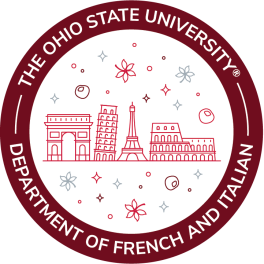
The most up-to-date list of course offerings is always available via View Schedule of Classes on BuckeyeLink.
Note on New GE Program
The University will roll out a new General Education program for new students beginning in Autumn 2022. These GE requirements will be called "General Education - New" or GEN.
Requirements for students under the previous General Education program will not change. They will continue to complete the same GE program — now called the "General Education – Legacy" or GEL.
Please refer to the Schedule of Classes via BuckeyeLink to view days and times of these offerings.
French Introductory Language - GEL Foreign Language; GEN: World Languages
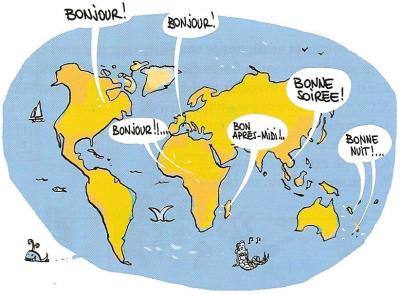
French 1101.01, 1102.01, 1103.01 - Beginning French I, II, and III Classroom (4 credit hours)
French 1101.21, 1102.21, 1103.21 - Beginning French I, II, and III Distance Learning (4 credit hours) 1101.21 also offered as an Asynchronous Distance Learning option (4 credit hours)
French 1101.61, 1102.61, 1103.61 - Beginning French I, II, and III Individualized Distance Learning (2-4 credit hours) *.61 Individualized Instruction sections are open only to students who need variable credit options to finish the language requirement. All other students interested in asynchronous should enroll in the appropriate .21 section.
French 1155.01 - Beginning French Review Classroom (4 credit hours)
French 1155.21 - Beginning French Review Distance Learning (4 credit hours)
Italian Introductory Language - GEL Foreign Language; GEN: World Languages
Italian 1101.03, 1102.03, 1103.03 - Beginning Italian I, II, and III Blended (4 credit hours)
Italian 1101.71, 1102.71, 1103.71 - Beginning Italian II and III Online (4 credit hours)
Italian 1198.71 - Italian on the Ground - 7W2 option
Professor Jonathan Combs-Schilling, ONLINE asynchronous (with 30-minute synchronous weekly partner meetings scheduled by students), 1 credit hour
This course will prepare students for a study abroad experience in Italy through an introduction to language, culture, and intercultural reflections.
Students must have permission to enroll. Write to Prof Weintritt (.1) and Matt Lang (.650) to request enrollment.
Italian 5101 - Intensive Italian - GEL: Foreign Language; GEN: World Languages
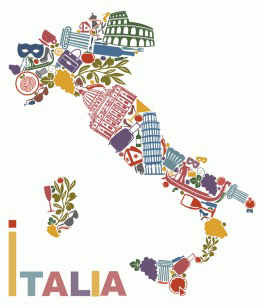
Undergraduate: 35471 / Graduate: 35472
Dr. Rosa Di Grottole, MWF 12:45pm-2:05pm, Hagerty Hall 050, 5 credit hours, taught in Italian
Intensive Italian covers the same material as Italian 1101, 1102, and 1103 in one semester! The course is fast-paced and ideal for students who are looking for a small, supportive, and inclusive classroom community and who find learning foreign languages interesting! Previous foreign language study ideal, but not required. Not open to native speakers of Italian.
French 2101.01 – Introduction to French & Francophone Studies
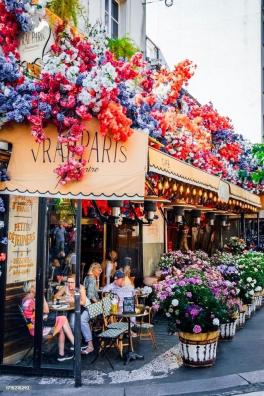
Dr. Kelly Campbell, TR 9:35am-1055am, Mendenhall Lab 174, 3 credit hours, taught in French.
Welcome to the threshold to the French minor and major! In French 2101, you will have the opportunity to practice and improve your reading, writing, listening, and speaking skills in French, as well as to continue learning about French & Francophone literatures and cultures through reading, viewing, and interpreting authentic literary and visual texts from around the Francophone world.
This lively course serves as a bridge between language courses (1101-1103) and upper-level courses in French. By emphasizing all four skills (listening, speaking, reading, and writing), it will improve your proficiency and prepare you for further coursework in language, literature, culture, and film and for a minor or major in French or French and Francophone Studies. In it you will interpret and analyse both in oral discussion and in writing a variety of texts (short stories, films, songs, posters, etc.) from France and the Francophone world. Some grammar points will be reviewed, although grammar will be covered more intensely in FR 3101, which may be taken either at the same time as or after FR2101.
French 2101.61 - Introduction to French & Francophone Studies I.I.
Professor Kate Schlosser, Online Individualized Instruction (I.I.), 1-3 credit hours, taught in French
Techniques for reading and interpreting different types of texts from the French-speaking world: stories, poetry, plays, films, music, and ads while building vocabulary, comprehension, speaking and writing skills.
Prereq: 1103.01, 1103.21, or 4 cr hrs of 1103.51 or 1103.61, or permission of instructor. Not open to students with credit for 2101.01, 2101.01H, or 2101.51. Repeatable to a maximum of 3 cr hrs or 3 completions. This course is available for EM credit.
French 2803.01 - Paris - GEL: Cultures & Ideas; GEN Theme: Lived Environments

Dr. Ryan Joyce, W 4:10pm-5:20pm, ONLINE, 3 credit hours, taught in English
What was the city of Paris like in 1789, and how have its geography and society evolved over the last two centuries? By reading and viewing representations of Paris in a variety of media (maps, paintings, photographs, films, and literary and historical texts), we will explore both how the city’s landscape has shaped its society and how its increasingly diverse society has in turn shaped and transformed its landscape to suit Parisians’ evolving needs, desires, and caprices. Each two-week unit will treat representations of a specific event or era in Parisian history that had a significant impact on the city’s organization, architecture, and/or demography, and together the units will give us a general understanding of Parisian history over the last 230 years and of the multiple ways in which that history has been represented, and thus manipulated for various purposes.
French 3101 - French Grammar Review
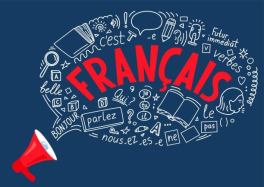
Dr. Gloria Torrini-Roblin, MWF 9:10am-10:05am, Derby Hall 030, 3 credit hours, taught in French
“Bootcamp French” in the words of a former student, this course improves your ability to speak and write. We will review grammar “rules”, focus on how context creates meaning, and strengthen vocabulary by studying false cognates . Through online discussions, personal narratives and opinion pieces, students will practice speaking and writing more nuanced, accurate French.
Prereq: 1103.01, 1103.21, 4 cr hrs of 1103.51 or 1103.61, or permission of instructor. Prereq or concur: 2101.01, 2101.01H, or 3 cr hrs of 2101.51 or 2101.61. This course is available for EM credit.
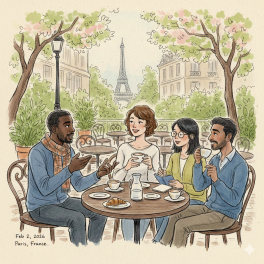
French 3102 - French Pronunciation & Performance
Professor Kate Schlosser, WF 11:10am-12:30pm, Scott Lab E0241, 3 credit hours, tuaght in French
Parlez-vous français ? In this class you will! French 3102 aims to guide all students toward more accurate pronunciation of the French language in its many iterations throughout the f/Francophone world. We will learn a new alphabet, review rules of pronunciation and diction, then put this knowledge to use through the performance of songs, poetry and plays. We will use film, television and YouTube to explore who speaks French and how they do it. After this class, you will never look at or listen to French the same again!
Prereq: 2101.01, 2101.01H, or 3 cr hrs of 2101.51.

French 3202 - Literary & Visual Texts of the Francophone World
Dr. Pauline Remy, TR 3:55pm-5:10pm, Hagerty Hall 159, 3 credit hours, taught in French
“Liminal transgressions: negotiating female agency, woman-hood and self-determination”
This course explores the myriad ways that women in the Francophone World navigate, negotiate and challenge familial, ancestral and religious dictates as well as the cultural, social, linguistic and political constraints of their respective post-colonial, post- independent and trans-national societies. By reading and analyzing representations of women in Francophone literary texts and multimedia, we will examine the subtle, creative and sometimes unexpected ways that women, and in the broader contexts, Francophone societies, have resisted, grappled with and continue to inform the status quo.
Prereq: 2101.01 (201.01), or 2101.01H, or 3 cr hrs of 2101.51 (5 cr hrs of 201.51), and 3101 (401). Not open to students with credit for 427.
French 3403 - French Culture & Cuisine
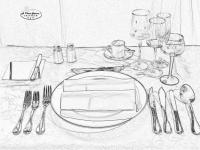
Professor Sarah-Grace Heller, TR 2:20pm-3:40pm, Hagerty Hall 159, 3 credit hours, taught in French
Explore Global French cultural ideas around dining, good table manners, and the meanings of food through short readings and media. Taste fabulous specialties and learn to cook to some simple and classic dishes from the many regions where the French language and the food culture go together. We will spice things up with a pinch of grammar review and plenty of conversation. Learn to read and translate recipes. Discuss and write about your personal experiences with food and with experiencing other cultures. This will be a practical and delicious language course.
Course information: Exploration of various facets of French and Francophone cultures through texts and media. Prereq: 2101.01 (201.01), or 2101.01H, or 3 cr hrs of 2101.51 (5 cr hrs of 201.51); and 3101 (401). FR 3403 is repeatable to a maximum of 6 cr hrs.
French 4100 - Advanced French Grammar for Contemporary Contexts
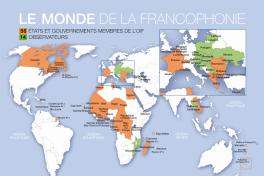
Dr. Anne Mutidjo, WF 12:45pm-2:05 pm, Hagerty Hall 046, 3 credit hours, taught in French
Why study advanced French grammar if you are interested in international affairs? Human rights? Food? Finance? Migrants? Medicine? To follow these issues in the francophone media, you need to master the written language by becoming a more educated, informed reader, as well as a more skilled, articulate writer of French.
This course replaces FR 5101 and is required for the French major for those have not yet taken 5101. Students who have already taken 5101 cannot register for this course. Prereq: 3101, and at least two other courses taught in French at the 3000-level or above; or permission of instructor. Not open to students with credit for 5101. This course is available for EM credit.
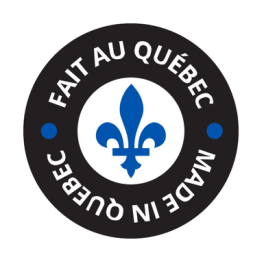
French 4401 – Fait au Québec: De la poutine à la musique populaire!
Professor Wynne Wong, TR 11:10am-12:30pm, Lazenby Hall 001, 3 credit hours, taught in French
Popular culture reflects the cultural identities, values, and aspirations of individuals and communities of a society. In Quebec, popular culture was more than just forms of cultural expression, it awakened a society’s desire for change. Centuries after the British conquest, while “French Canadians” were the majority in numbers, it was the minority English-speaking subculture who held economic and social power in the province. Around the 1950s, artists who were fueled by the desire to build a distinct French-speaking nation within Canada and who wanted French speakers to take control of their own destiny used music and other vehicles of cultural expression to sow the seeds of change. This movement eventually culminated in la revolution tranquille which was an important catalyst in putting power and control back in the hands of French speakers.
Quebec’s cultural landscape today reflects many diverse influences, such as those of Indigenous communities, French settlers, British colonists, and different waves of global immigration. This course examines the evolution of Quebec’s cultural expressions to gain an understanding of how social and linguistic reforms of la révolution tranquille have impacted the development and circulation of cultural products in Quebec. We explore how the concept of fait au Québec has evolved, shaped by different subcultures throughout Quebec’s history.
Prereq: 3101; and 3201, 3202, 3401, 3402, 3403, 3501, or 3701; or permission of instructor. Repeatable to a maximum of 6 cr hrs.
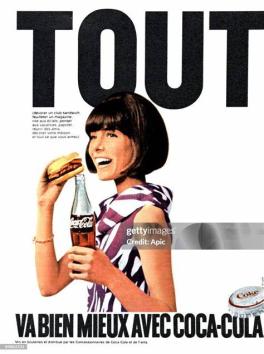
French 5204 - Coca-Colonization and Beyond: The Challenge of Modernization in Post-Second-World-War France
UUndergraduate: 34795 / Graduate: 34794
Professor Jennifer Willging, TR 12:45pm-2:05pm, Derby Hall 048, 3 credit hours, taught in French
In this course we will examine literary and cultural texts that treat the challenges of the different types of modernization—artistic, social, economic, and political—that France underwent following the Second World War, some of these attributable at least in part to the strong influence of a newly powerful United States. We will explore France’s extraordinarily rapid and often painful recovery from the devastation and demoralization of the war and its transformation, to the dismay of some of its own citizens, into the highly modern, technological, and consumerist nation it is today. The principal objective will be to understand better the evolution of French society and culture over the last eighty years through texts that celebrate this modernization, lament it, or do some combination of the two. Students will gain an understanding of the mechanisms by which powerful nations like the U.S. assert their influence and how other nations react to it, as well as improve their listening, speaking, reading and writing skills in French.
Prereq: 3101, and one of the following courses: 3201, 3202, 3401, 3402, 3403, or 4401; or Grad standing (graduate students require permission of the Graduate Studies Chair).
French 5601 - Center of Excellence Colloquium
Undergraduate: 30636 / Graduate: 30484
Professor Benjamin Hoffmann, M 11:30am-12:25pm, ONLINE, 1 credit hour, taught in French
This dynamic workshop offers students a unique opportunity to engage with world-renowned scholars and award-winning novelists visiting The Ohio State University. You’ll attend four exclusive events featuring international experts who will share their groundbreaking work. You'll also have the chance to meet and have lunch with these guest speakers, gaining personal insights into their research and creative processes while practicing your French outside the classroom. As part of the French Press Literary Channel, you’ll either interview a French-speaking author or record a short video review of a recent novel. Please see this French Press announcement for the SP25 series. This workshop is a great option for maintaining your French language skills, especially if you’re unable to fit a 3-credit course into your busy schedule. The assignments are designed to be very flexible and fit around your existing commitments. No heavy workload—just an exciting opportunity to connect with leading voices in French and Francophone culture!
Prereq: Grad standing; or 3101 or equivalent. Repeatable to a maximum of 6 credit hours. This course is graded S/U.

Italian 2053 - Italian Cinema - GEL: Visual & Performing Arts; GEL Diversity: Global Studies; GEN Foundation: Literary, Visual, & Performing Arts
7W2 - Professor Giuliano Migliori, TR 2:20pm-5:00pm, Journalism Building 300, 3 credit hours, taught in English
Through examining the crossovers between ‘private’ arenas of home and family and ‘public’ realms of politics, the economy, and religion, this course aims to disclose how, in Italian culture, the personal spheres, the political battlefields, and the natural are inextricably linked. This course presents students with an overview of Italian cinema of the last eighty years and we will look in detail at films and serial television by several important Italian directors. We will touch upon major movements in Italian screen history, including Neorealism, ecological and industrial cinema, the spaghetti western filone, political cinema, postcolonial migrant films, and quality television shows unfolding new ways to look at Italian-ness. Topics and historical periods to be addressed include: Italian fascism (including Italy’s problematic alliance with Nazi Germany and the Partisan Resistance,) the role of cities and industries in the so-called ‘economic miracle’, gender and race relations, the Years of Lead and domestic terrorism, migration crisis, and new Italian Epic. How has the cinematic medium (re)produced different cultural margins of Italy? Taught in English.
Italian 2055 - Mafia Movies - GEL: Visual & Performing Arts; GEN Foundation: Literary, Visual, & Performing Arts

Professor Giuliano Migliori, WF 2:20pm-3:40 pm, ONLINE, 3 credit hours, taught in English
*This class is fully online. Distance synchronous with asynchronous components
GEL Visual and Performing Arts, GEN Foundation: Literary, Visual & Performing Arts.
The Mafia in Italy is referred to as an octopus as the organization pervades almost every facet of Italian cultural life. Tony Soprano, Don Vito and Michael Corleone, Lucky Luciano, Robert De Niro, Martin Scorsese, or Christopher Moltisanti are some of the figures that contribute to the myth of the Italian and Italian-American Mafias. Others, such as Jonas Carpignano, Peppino Impastato, and Roberto Saviano explore a new cinematic wave about organized crime. In this course we watch Italian and American mafia movie and television hits, and explore the myth of the Mafia that is so widespread in American popular culture, and trace its histories and receptions as it passes across time and through a variety of cinematic styles. We will question whether there exists a unique American or Italian cinema and television treating Mafias, in its polymorphic nature, and explore how filmmakers from the two countries approach the subject in dissimilar fashions, especially in terms of stereotyping, gender, politics, and representations of violence and alluring criminals.
This course can count as a course taught in English toward the Italian minor and the Italian or Italian Studies majors.
Italian 2102 - Contemporary Italian Society
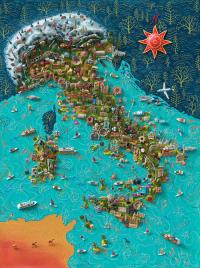
Demetrio Antolini, TR 9:35am-10:55am, Hagerty Hall 251, 3 credit hours, taught in Italian
How did we arrive at the contemporary forms of Italian culture that one can find in Rome today? As the adage goes, "All roads lead to Rome," and indeed diverse trajectories have brought immigrants from within Italy and from abroad to call the capital city home. Deep and lasting transformations of Italian culture and society are more and more apparent; the influence of Italy’s institutions is waning, as a result of shifting and broadening traditions, values, and perspectives of what was once dominant and normative Italian cultural beliefs on religion, gender, family, and more. All these transformations are at play in the principal text of this course: the best-selling 2006 novel Clash of Civilizations for an Elevator in Piazza Vittorio by Amara Lakhous, an acclaimed Algerian-Italian author. Particularly when reading the principal novel but also in additional readings and videos, we will delve into the convergence of 20th and 21st century Italian cultural history and language expression through analysis of a variety of contemporary speech registrars, dialects, European cultural reference points, and immigration and refugee crises at the turn of the century.
In this course we explore modern and contemporary Italian society as we focus on the four language skills: listening, reading, writing, and speaking. Since you are transitioning from the elementary to the intermediate level, more emphasis will be placed on developing your reading skills, so you will be exposed to a lot of authentic Italian texts of different lengths and in different genres. However, your listening, writing, and speaking skills will not be ignored! Grammar will be reviewed and tested throughout the course.
The targeted structures are a review of nouns and adjectives; regular and irregular present indicative verbs; the passato prossimo, the imperfect, the past perfect (trapassato prossimo) and the remote past (passato remoto); the subjunctive mood, hypothetical constructions, and relative and interrogative pronouns.
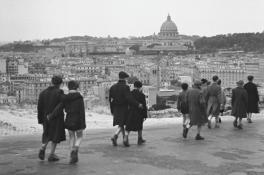
Italian 3224 - Post-Unification Italy
Professor Qian Liu, TR 2:20pm-3:40pm, Hagerty Hall 251, 3 credit hours, taught in Italian
The unification of Italy in 1861 marked the historical beginning of modern Italy, laying the foundation for a new national identity that would continue to evolve while facing multiple challenges. In this course, we will explore some of Italy’s most significant moments and topics from its unification to the present day through the geographical lens of its capital, Rome. How did modern Italian society transform Rome’s urban landscape, and how did Rome, in turn, shape Italians’ views on its national identity and urban life? Through a diverse array of media (novels, poems, films, songs, maps, photographs, paintings, and installation art), we will address these questions by surveying themes such as the Risorgimento, Italy’s Southern Question, fascism and colonialism, the Resistenza, Neorealism, issues of gender and sexuality, Italy’s economic boom, urban ecology, immigration, and the African diaspora in Italy. This class aims to deepen students’ understanding of modern Italian history and culture while enhancing their four language skills in reading, speaking, listening, and writing. Taught in Italian.
Prereq: 2102 (202). FL Admis Cond course.
Italian 5101 - Intensive Italian - GEL: Foreign Language; GEN: World Languages

Undergraduate: 35471 / Graduate: 35472
Dr. Rosa Di Grottole, MWF 12:45pm-2:05pm, Hagerty Hall 050, 5 credit hours, taught in Italian
Intensive Italian covers the same material as Italian 1101, 1102, and 1103 in one semester! The course is fast-paced and ideal for students who are looking for a small, supportive, and inclusive classroom community and who find learning foreign languages interesting! Previous foreign language study ideal, but not required. Not open to native speakers of Italian.
Italian 5194 - Impegno and its Afterlives
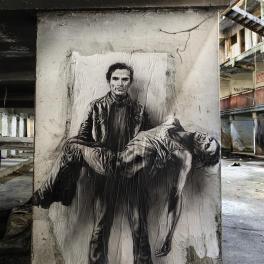
Undergraduate: 37597 / Graduate: 37596
Professor Jonathan Mullins, TR 12:45pm-2:05pm, Hagerty Hall 206, 1-9 credit hours, taught in Italian
Students must have instructor's permission to enroll.
This course looks at the Italian concept and tradition of impegno, or political commitment. It introduces students to the way that impegno emerged in the 20th century as a way of understanding the interventions of activists, agitators, thinkers and artists in political life and Italian civil society. It will also assess the changes it has undergone in the 21st century as traditional spaces and channels for political participation have changed in the age of digital culture and changing demographics have reshaped Italian identity. We will look at a wide variety of political writing, still and moving images, as well as embodied and digital performance. In Italian.
FRIT 3054 - The 21st-Century Skill: Intercultural Competence for Global Citizenship - GEL Diversity: Global Studies; GEN Theme: Citizenship for a Diverse & Just World
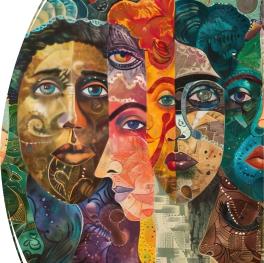
29027: Professor April Weintritt, TR 2:20pm-3:40pm, Mendenhall Lab 115, 3 credit hours, taught in English
30475: Professor Janice Aski, TR 2:20pm-3:40pm, Mendenhall Lab 191, 3 credit hours, taught in English
30476: Carrie Ann Thomas, MW 2:20pm-3:40pm, Denney Hall 250, 3 credit hours, taught in English
30477: Dr. Salome Fouts, WF 11:40am-12:30pm, Jennings Hall 140, 3 credit hours, taught in English
34808: Dr. Cindy Jiang, TR 12:45pm-2:05pm, Jennings Hall 164, 3 credit hours, taught in English
Intercultural competence is an essential characteristic for becoming globally-minded and functioning in multiple, diverse, local and non-local networks, and for that reason it has been identified as being among the top ten skills necessary for succeeding in the 21st century. Achieving the skills, knowledge, behaviors and attitudes of interculturally competent global citizens is a lifetime endeavor, so in this course you will acquire the foundations for the journey. This course is divided into four modules: 1) Foundational concepts; 2) Intercultural interactions; 3) Intercultural (communicative) competence; 4) Intercultural competence and citizenship. We will begin by exploring the complexities of the term ‘culture’ and how culture shapes our understanding of ourselves and others, our identity, and our worldview. You will explore your own cultural background by doing a cultural autobiography. You will delve into how implicit biases and stereotypes impact your interactions with others and learn to engage in inclusive practices that make you a better team player by participating in an investigative intercultural team project. In addition, you will learn the unique ways in which learning a world language and experiencing other cultures contribute to the development of intercultural competence.
This course meets the goals and expected learning outcomes of the GE theme category: Citizenship for a just and diverse world. It also counts as a course taught in English for the Italian/Italian studies majors and minor, and the French/French and Francophone studies majors and minor. This course also counts toward the ASC Leadership major.
Italian 5101 - Intensive Italian - GEL: Foreign Language; GEN: World Languages

Undergraduate: 35471 / Graduate: 35472
Dr. Rosa Di Grottole, MWF 12:45pm-2:05pm, room TBD, 5 credit hours, taught in Italian
Intensive Italian covers the same material as Italian 1101, 1102, and 1103 in one semester! The course is fast-paced and ideal for students who are looking for a small, supportive, and inclusive classroom community and who find learning foreign languages interesting! Previous foreign language study ideal, but not required. Not open to native speakers of Italian.
Italian 5194 - Impegno and its Afterlives

Undergraduate: 37597 / Graduate: 37596
Professor Jonathan Mullins, TR 12:45pm-2:05pm, Hagerty Hall 206, 1-9 credit hours, taught in Italian
Students must have instructor's permission to enroll.
Impegno and its Afterlives
This course looks at the Italian concept and tradition of impegno, or political commitment. It introduces students to the way that impegno emerged in the 20th century as a way of understanding the interventions of activists, agitators, thinkers and artists in political life and Italian civil society. It will also assess the changes it has undergone in the 21st century as traditional spaces and channels for political participation have changed in the age of digital culture and changing demographics have reshaped Italian identity. We will look at a wide variety of political writing, still and moving images, as well as embodied and digital performance. In Italian.

French 5204 - Coca-Colonization and Beyond: The Challenge of Modernization in Post-Second-World-War France
Undergraduate: 34795 / Graduate: 34794
Professor Jennifer Willging, TR 12:45pm-2:05pm, Derby Hall 048, 3 credit hours, taught in French
In this course we will examine literary and cultural texts that treat the challenges of the different types of modernization—artistic, social, economic, and political—that France underwent following the Second World War, some of these attributable at least in part to the strong influence of a newly powerful United States. We will explore France’s extraordinarily rapid and often painful recovery from the devastation and demoralization of the war and its transformation, to the dismay of some of its own citizens, into the highly modern, technological, and consumerist nation it is today. The principal objective will be to understand better the evolution of French society and culture over the last eighty years through texts that celebrate this modernization, lament it, or do some combination of the two. Students will gain an understanding of the mechanisms by which powerful nations like the U.S. assert their influence and how other nations react to it, as well as improve their listening, speaking, reading and writing skills in French.
Prereq: 3101, and one of the following courses: 3201, 3202, 3401, 3402, 3403, or 4401; or Grad standing (graduate students require permission of the Graduate Studies Chair).
French 5601 - Center of Excellence Colloquium
Undergraduate: 30636 / Graduate: 30484
Professor Benjamin Hoffmann, M 11:30am-12:25pm, ONLINE, 1 credit hour, taught in French
This dynamic workshop offers students a unique opportunity to engage with world-renowned scholars and award-winning novelists visiting The Ohio State University. You’ll attend four exclusive events featuring international experts who will share their groundbreaking work. You'll also have the chance to meet and have lunch with these guest speakers, gaining personal insights into their research and creative processes while practicing your French outside the classroom. As part of the French Press Literary Channel, you’ll either interview a French-speaking author or record a short video review of a recent novel. Please see this French Press announcement for the SP25 series. This workshop is a great option for maintaining your French language skills, especially if you’re unable to fit a 3-credit course into your busy schedule. The assignments are designed to be very flexible and fit around your existing commitments. No heavy workload—just an exciting opportunity to connect with leading voices in French and Francophone culture!
Prereq: Grad standing; or 3101 or equivalent. Repeatable to a maximum of 6 credit hours. This course is graded S/U.
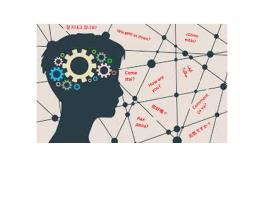
FRIT 8302 - Issues in Second Language Acquisition
Professor Wynne Wong, ONLINE asynchronous, 3 credit hours, taught in English
FRIT Graduate Associates should work with their faculty advisors and the Academic Program Coordinator if enrolling in 8303 (teaching apprenticeship), 8998 (pre-candidacy), 8999 (dissertation research), or 8899 (dissertation workshop) hours.
